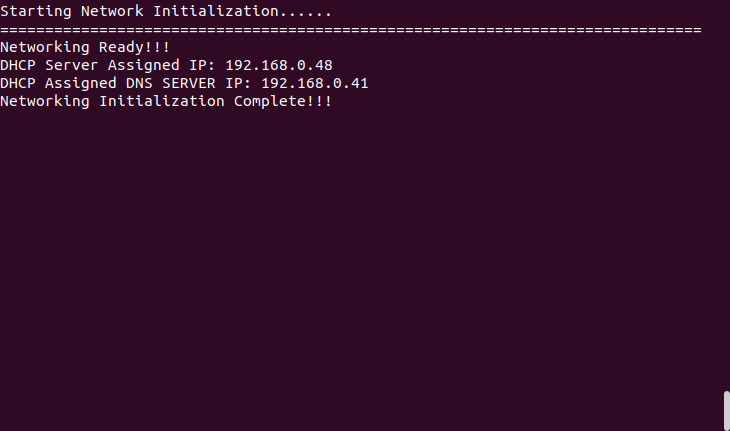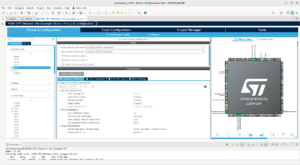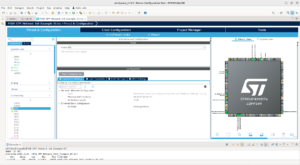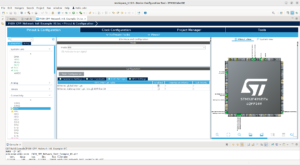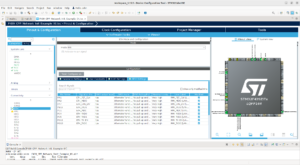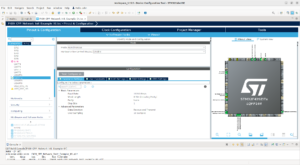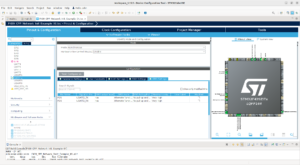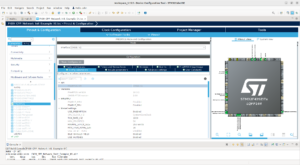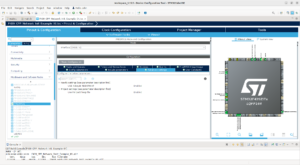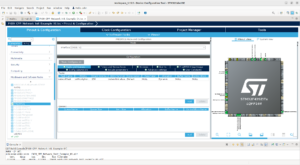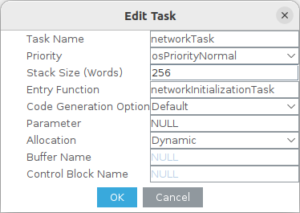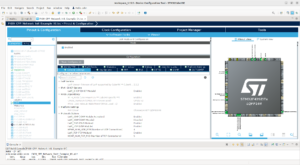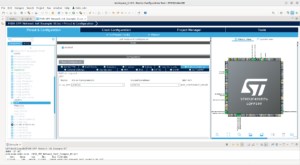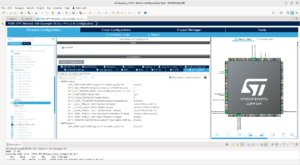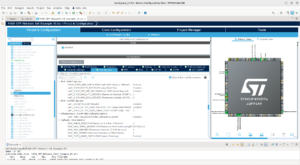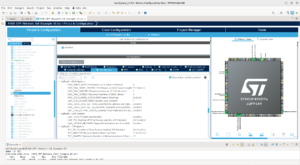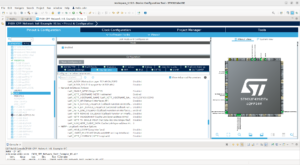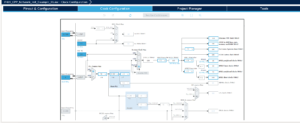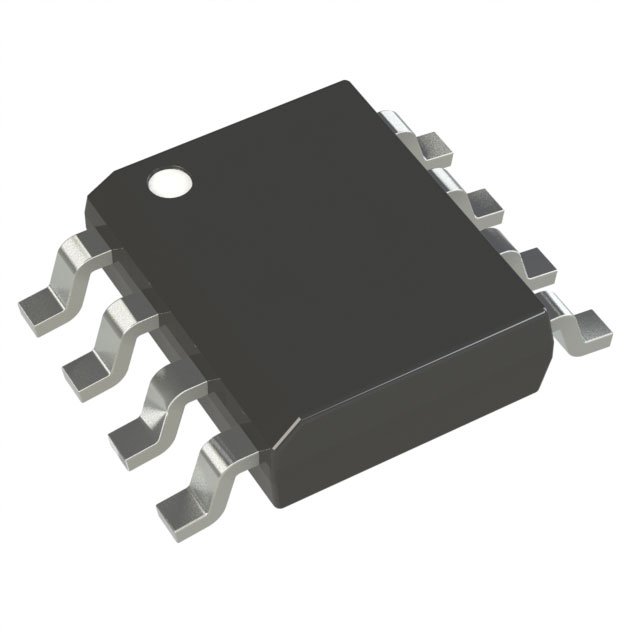Introduction
In this tutorial, we shall explore how to Setup a Network Interface on a STM32 µP with freeRTOS. We will be using a Nucleo-F439ZI board plugged into a network via the RJ45 connector that comes with the board. To complete the connection will require a Ethernet cable to your switch.
For those not familiar with freeRTOS and STM32 products, I highly recommend watching this video as it will be very helpful: Introduction to freeRTOS
The configuration assumes that this network setup is configured to support DHCP. DHCP allows devices on the network to acquire an IP4/IP6 address from the DHCP server. DHCP servers also will hand out the DNS server (Domain Name Servers) IP address that the network is using for name resolution. Using a DHCP server to assign IP address, negates the need to assign a static IP address. This also means that the Nucleo board may be assigned different IP addresses over time when disconnected and reconnected.
Materials List
- FTDI to USB
- NUCLEO-F439ZI
- Breadboards Kit Include 2PCS 830 Point 2PCS 400 Point Solderless Breadboards
FTDI Pinouts
FTDI to USB Pinout from right to left
- Pin 1 – GND
- Pin 2 – CTS
- Pin 3 – VCC
- Pin 4 – TX
- Pin 5 – RX
- Pin 6 – DTR
- USB Mini – Connect to PC via USB cable
Make sure the jumper is set for 5v or 3v which ever is being used to power the FTDI device. If we look below at the schematic, it is showing in this case as 5v.
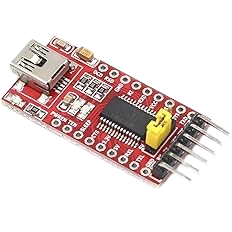
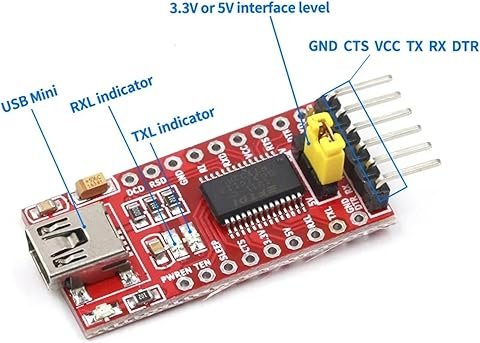
Nucleo-F439ZI
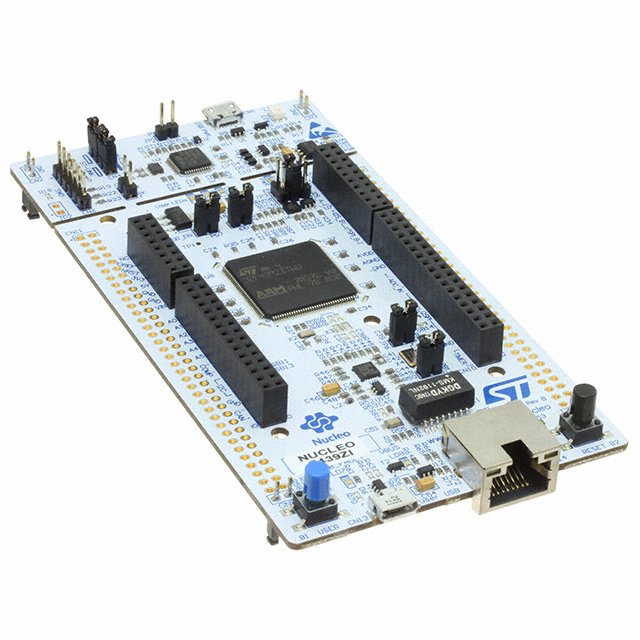
Schematic
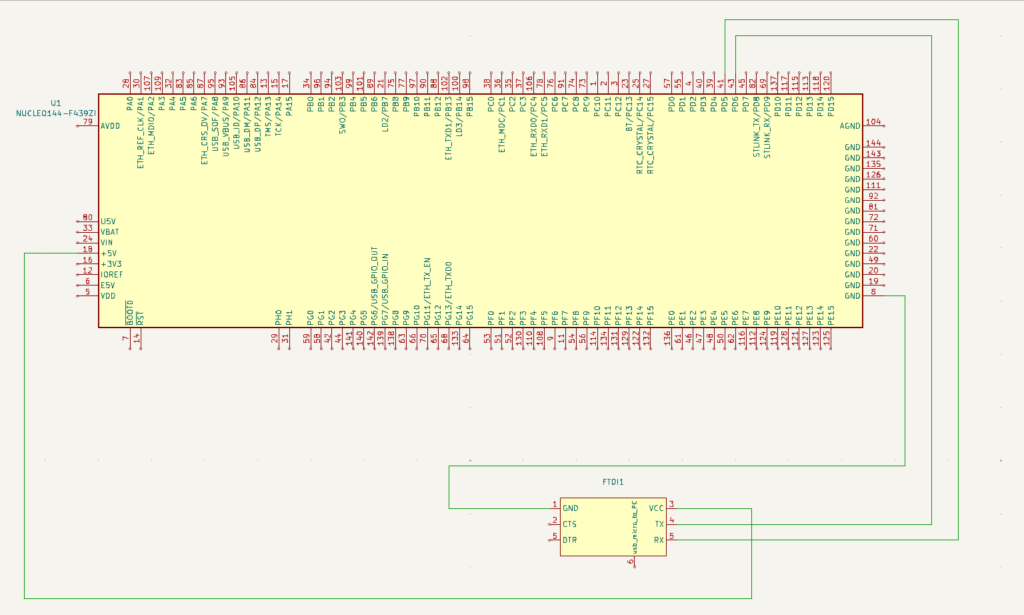
Pinouts & Configurations
For this tutorial rather than try to capture screenshots for each pinout & configuration screen, we generated a PDF of all of the settings within the IOC file, which is included below. However, for this tutorial we’ve included the screenshots as a bonus.
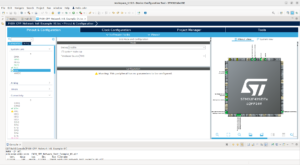
Exploring the Source Code
main.h
/* USER CODE BEGIN Header */
/**
******************************************************************************
* @file : main.h
* @brief : Header for main.c file.
* This file contains the common defines of the application.
******************************************************************************
* @attention
*
* Copyright (c) 2025 STMicroelectronics.
* All rights reserved.
*
* This software is licensed under terms that can be found in the LICENSE file
* in the root directory of this software component.
* If no LICENSE file comes with this software, it is provided AS-IS.
*
******************************************************************************
*/
/* USER CODE END Header */
/* Define to prevent recursive inclusion -------------------------------------*/
#ifndef __MAIN_H
#define __MAIN_H
#ifdef __cplusplus
extern "C" {
#endif
/* Includes ------------------------------------------------------------------*/
#include "stm32f4xx_hal.h"
/* Private includes ----------------------------------------------------------*/
/* USER CODE BEGIN Includes */
/* USER CODE END Includes */
/* Exported types ------------------------------------------------------------*/
/* USER CODE BEGIN ET */
/* USER CODE END ET */
/* Exported constants --------------------------------------------------------*/
/* USER CODE BEGIN EC */
/* USER CODE END EC */
/* Exported macro ------------------------------------------------------------*/
/* USER CODE BEGIN EM */
/* USER CODE END EM */
/* Exported functions prototypes ---------------------------------------------*/
void Error_Handler(void);
/* USER CODE BEGIN EFP */
/* USER CODE END EFP */
/* Private defines -----------------------------------------------------------*/
#define MCO_Pin GPIO_PIN_0
#define MCO_GPIO_Port GPIOH
#define RMII_MDC_Pin GPIO_PIN_1
#define RMII_MDC_GPIO_Port GPIOC
#define RMII_REF_CLK_Pin GPIO_PIN_1
#define RMII_REF_CLK_GPIO_Port GPIOA
#define RMII_MDIO_Pin GPIO_PIN_2
#define RMII_MDIO_GPIO_Port GPIOA
#define RMII_CRS_DV_Pin GPIO_PIN_7
#define RMII_CRS_DV_GPIO_Port GPIOA
#define RMII_RXD0_Pin GPIO_PIN_4
#define RMII_RXD0_GPIO_Port GPIOC
#define RMII_RXD1_Pin GPIO_PIN_5
#define RMII_RXD1_GPIO_Port GPIOC
#define RMII_TXD1_Pin GPIO_PIN_13
#define RMII_TXD1_GPIO_Port GPIOB
#define RMII_TX_EN_Pin GPIO_PIN_11
#define RMII_TX_EN_GPIO_Port GPIOG
#define RMII_TXD0_Pin GPIO_PIN_13
#define RMII_TXD0_GPIO_Port GPIOG
/* USER CODE BEGIN Private defines */
#define REDIRECT_PRINTF
/* USER CODE END Private defines */
#ifdef __cplusplus
}
#endif
#endif /* __MAIN_H */
main.c
We’ve added a method to override the default callback when the Ethernet cable is disconnected or reconnected. The function void link_myCallBack(struct netif *netif) is declared on lines 94-115. The call to this function in main() is located on lines: 362-366. This overrides the default which is initiated in lwip.c line 80 with the MX_LWIP_Init funciton.
/* USER CODE BEGIN Header */
/**
******************************************************************************
* @file : main.c
* @brief : Main program body
******************************************************************************
* @attention
*
* Copyright (c) 2025 STMicroelectronics.
* All rights reserved.
*
* This software is licensed under terms that can be found in the LICENSE file
* in the root directory of this software component.
* If no LICENSE file comes with this software, it is provided AS-IS.
*
******************************************************************************
*/
/* USER CODE END Header */
/* Includes ------------------------------------------------------------------*/
#include "main.h"
#include "cmsis_os.h"
#include "lwip.h"
#include "dns.h"
/* Private includes ----------------------------------------------------------*/
/* USER CODE BEGIN Includes */
#include "stdbool.h"
/* USER CODE END Includes */
/* Private typedef -----------------------------------------------------------*/
/* USER CODE BEGIN PTD */
/* USER CODE END PTD */
/* Private define ------------------------------------------------------------*/
/* USER CODE BEGIN PD */
/* USER CODE END PD */
/* Private macro -------------------------------------------------------------*/
/* USER CODE BEGIN PM */
/* USER CODE END PM */
/* Private variables ---------------------------------------------------------*/
UART_HandleTypeDef huart2;
/* Definitions for networkTask */
osThreadId_t networkTaskHandle;
const osThreadAttr_t networkTask_attributes = {
.name = "networkTask",
.stack_size = 256 * 4,
.priority = (osPriority_t) osPriorityNormal,
};
/* USER CODE BEGIN PV */
bool waitingOnNetwork = true;
bool dhcpReady = false;
/* USER CODE END PV */
/* Private function prototypes -----------------------------------------------*/
void SystemClock_Config(void);
static void MX_GPIO_Init(void);
static void MX_USART2_UART_Init(void);
void networkInitializationTask(void *argument);
/* USER CODE BEGIN PFP */
void link_myCallBack(struct netif *netif);
/* USER CODE END PFP */
/* Private user code ---------------------------------------------------------*/
/* USER CODE BEGIN 0 */
#ifdef REDIRECT_PRINTF
#define PUTCHAR_PROTOTYPE int __io_putchar(int ch)
#endif
#ifdef REDIRECT_PRINTF
PUTCHAR_PROTOTYPE
{
HAL_UART_Transmit(&huart2, (uint8_t *)&ch, 1, 0xFFFF);
return ch;
}
#endif
#define ETH_DEVICE 0
void link_myCallBack(struct netif *netif) {
uint32_t regValue = 0;
if (HAL_ETH_ReadPHYRegister(&heth, ETH_DEVICE, PHY_BSR, ®Value) == HAL_OK) {
if((regValue & PHY_LINKED_STATUS) == (uint16_t)RESET) {
if (!netif_is_link_up(netif)) { // Link status = disconnected
netif_set_down(netif);
printf("Network cable is now disconnected!!!\r\n");
netif_set_link_down(netif);
}
} else {
if (netif_is_link_up(netif)) { // Link status = connected
printf("Network cable is now connected!!!\r\n");
printf("Rebooting the system!!!\r\n");
osDelay(2000);
// We could try to write some sort of recovery logic to handle a reconnection, however.... (Boom!!!)
NVIC_SystemReset(); // Reboot the microprocessor and start the application over.
}
}
}
}
/* USER CODE END 0 */
/**
* @brief The application entry point.
* @retval int
*/
int main(void)
{
/* USER CODE BEGIN 1 */
/* USER CODE END 1 */
/* MCU Configuration--------------------------------------------------------*/
/* Reset of all peripherals, Initializes the Flash interface and the Systick. */
HAL_Init();
/* USER CODE BEGIN Init */
/* USER CODE END Init */
/* Configure the system clock */
SystemClock_Config();
/* USER CODE BEGIN SysInit */
/* USER CODE END SysInit */
/* Initialize all configured peripherals */
MX_GPIO_Init();
MX_USART2_UART_Init();
/* USER CODE BEGIN 2 */
/* USER CODE END 2 */
/* Init scheduler */
osKernelInitialize();
/* USER CODE BEGIN RTOS_MUTEX */
/* add mutexes, ... */
/* USER CODE END RTOS_MUTEX */
/* USER CODE BEGIN RTOS_SEMAPHORES */
/* add semaphores, ... */
/* USER CODE END RTOS_SEMAPHORES */
/* USER CODE BEGIN RTOS_TIMERS */
/* start timers, add new ones, ... */
/* USER CODE END RTOS_TIMERS */
/* USER CODE BEGIN RTOS_QUEUES */
/* add queues, ... */
/* USER CODE END RTOS_QUEUES */
/* Create the thread(s) */
/* creation of networkTask */
networkTaskHandle = osThreadNew(networkInitializationTask, NULL, &networkTask_attributes);
/* USER CODE BEGIN RTOS_THREADS */
/* add threads, ... */
/* USER CODE END RTOS_THREADS */
/* USER CODE BEGIN RTOS_EVENTS */
/* add events, ... */
/* USER CODE END RTOS_EVENTS */
/* Start scheduler */
osKernelStart();
/* We should never get here as control is now taken by the scheduler */
/* Infinite loop */
/* USER CODE BEGIN WHILE */
while (1)
{
/* USER CODE END WHILE */
/* USER CODE BEGIN 3 */
}
/* USER CODE END 3 */
}
/**
* @brief System Clock Configuration
* @retval None
*/
void SystemClock_Config(void)
{
RCC_OscInitTypeDef RCC_OscInitStruct = {0};
RCC_ClkInitTypeDef RCC_ClkInitStruct = {0};
/** Configure the main internal regulator output voltage
*/
__HAL_RCC_PWR_CLK_ENABLE();
__HAL_PWR_VOLTAGESCALING_CONFIG(PWR_REGULATOR_VOLTAGE_SCALE1);
/** Initializes the RCC Oscillators according to the specified parameters
* in the RCC_OscInitTypeDef structure.
*/
RCC_OscInitStruct.OscillatorType = RCC_OSCILLATORTYPE_HSI;
RCC_OscInitStruct.HSIState = RCC_HSI_ON;
RCC_OscInitStruct.HSICalibrationValue = RCC_HSICALIBRATION_DEFAULT;
RCC_OscInitStruct.PLL.PLLState = RCC_PLL_ON;
RCC_OscInitStruct.PLL.PLLSource = RCC_PLLSOURCE_HSI;
RCC_OscInitStruct.PLL.PLLM = 8;
RCC_OscInitStruct.PLL.PLLN = 180;
RCC_OscInitStruct.PLL.PLLP = RCC_PLLP_DIV2;
RCC_OscInitStruct.PLL.PLLQ = 4;
if (HAL_RCC_OscConfig(&RCC_OscInitStruct) != HAL_OK)
{
Error_Handler();
}
/** Activate the Over-Drive mode
*/
if (HAL_PWREx_EnableOverDrive() != HAL_OK)
{
Error_Handler();
}
/** Initializes the CPU, AHB and APB buses clocks
*/
RCC_ClkInitStruct.ClockType = RCC_CLOCKTYPE_HCLK|RCC_CLOCKTYPE_SYSCLK
|RCC_CLOCKTYPE_PCLK1|RCC_CLOCKTYPE_PCLK2;
RCC_ClkInitStruct.SYSCLKSource = RCC_SYSCLKSOURCE_PLLCLK;
RCC_ClkInitStruct.AHBCLKDivider = RCC_SYSCLK_DIV1;
RCC_ClkInitStruct.APB1CLKDivider = RCC_HCLK_DIV4;
RCC_ClkInitStruct.APB2CLKDivider = RCC_HCLK_DIV2;
if (HAL_RCC_ClockConfig(&RCC_ClkInitStruct, FLASH_LATENCY_5) != HAL_OK)
{
Error_Handler();
}
}
/**
* @brief USART2 Initialization Function
* @param None
* @retval None
*/
static void MX_USART2_UART_Init(void)
{
/* USER CODE BEGIN USART2_Init 0 */
/* USER CODE END USART2_Init 0 */
/* USER CODE BEGIN USART2_Init 1 */
/* USER CODE END USART2_Init 1 */
huart2.Instance = USART2;
huart2.Init.BaudRate = 19200;
huart2.Init.WordLength = UART_WORDLENGTH_8B;
huart2.Init.StopBits = UART_STOPBITS_1;
huart2.Init.Parity = UART_PARITY_NONE;
huart2.Init.Mode = UART_MODE_TX_RX;
huart2.Init.HwFlowCtl = UART_HWCONTROL_NONE;
huart2.Init.OverSampling = UART_OVERSAMPLING_16;
if (HAL_UART_Init(&huart2) != HAL_OK)
{
Error_Handler();
}
/* USER CODE BEGIN USART2_Init 2 */
/* USER CODE END USART2_Init 2 */
}
/**
* @brief GPIO Initialization Function
* @param None
* @retval None
*/
static void MX_GPIO_Init(void)
{
/* USER CODE BEGIN MX_GPIO_Init_1 */
/* USER CODE END MX_GPIO_Init_1 */
/* GPIO Ports Clock Enable */
__HAL_RCC_GPIOC_CLK_ENABLE();
__HAL_RCC_GPIOH_CLK_ENABLE();
__HAL_RCC_GPIOA_CLK_ENABLE();
__HAL_RCC_GPIOB_CLK_ENABLE();
__HAL_RCC_GPIOD_CLK_ENABLE();
__HAL_RCC_GPIOG_CLK_ENABLE();
/* USER CODE BEGIN MX_GPIO_Init_2 */
/* USER CODE END MX_GPIO_Init_2 */
}
/* USER CODE BEGIN 4 */
/* USER CODE END 4 */
/* USER CODE BEGIN Header_networkInitializationTask */
/**
* @brief Function implementing the networkTask thread.
* @param argument: Not used
* @retval None
*/
/* USER CODE END Header_networkInitializationTask */
void networkInitializationTask(void *argument)
{
/* init code for LWIP */
MX_LWIP_Init();
/* USER CODE BEGIN 5 */
osDelay(2000);
extern struct netif gnetif;
while (ip4_addr_isany_val(*netif_ip4_addr(&gnetif))) {
osDelay(200);
}
printf("\x1b[2J\x1b[H"); // Clear the dumb terminal screen
printf("Starting Network Initialization......\r\n");
char buffer[128];
printf("==============================================================================\n\r");
char *ipstr = ip4addr_ntoa(netif_ip4_addr(&gnetif));
sprintf(buffer, "Networking Ready!!!\r\n");
printf(buffer);
sprintf(buffer, "DHCP Server Assigned IP: %s\r\n", ipstr);
printf(buffer);
const ip_addr_t *ipaddr;
ipaddr = dns_getserver(0);
dhcpReady = !(ip4_addr_isany_val(*ipaddr));
while (!dhcpReady) {
osDelay(200);
ipaddr = dns_getserver(0);
dhcpReady = !(ip4_addr_isany_val(*ipaddr));
}
sprintf(buffer, "DHCP Assigned DNS SERVER IP: %s\r\n", ip4addr_ntoa(ipaddr));
printf(buffer);
// Here we override the default callback defined in the MX_LWIP_Init() function which defaults to:
// netif_set_link_callback(&gnetif, ethernet_link_status_updated);
//
// Setup our callback to handle ethernet cable disconnect/reconnect and override the default callback of: ethernet_link_status_updated
netif_set_link_callback(&gnetif, link_myCallBack);
sprintf(buffer, "Networking Initialization Complete!!!\r\n");
printf(buffer);
waitingOnNetwork = false;
/* Infinite loop */
for(;;)
{
osDelay(1);
}
/* USER CODE END 5 */
}
/**
* @brief Period elapsed callback in non blocking mode
* @note This function is called when TIM6 interrupt took place, inside
* HAL_TIM_IRQHandler(). It makes a direct call to HAL_IncTick() to increment
* a global variable "uwTick" used as application time base.
* @param htim : TIM handle
* @retval None
*/
void HAL_TIM_PeriodElapsedCallback(TIM_HandleTypeDef *htim)
{
/* USER CODE BEGIN Callback 0 */
/* USER CODE END Callback 0 */
if (htim->Instance == TIM6) {
HAL_IncTick();
}
/* USER CODE BEGIN Callback 1 */
/* USER CODE END Callback 1 */
}
/**
* @brief This function is executed in case of error occurrence.
* @retval None
*/
void Error_Handler(void)
{
/* USER CODE BEGIN Error_Handler_Debug */
/* User can add his own implementation to report the HAL error return state */
__disable_irq();
while (1)
{
}
/* USER CODE END Error_Handler_Debug */
}
#ifdef USE_FULL_ASSERT
/**
* @brief Reports the name of the source file and the source line number
* where the assert_param error has occurred.
* @param file: pointer to the source file name
* @param line: assert_param error line source number
* @retval None
*/
void assert_failed(uint8_t *file, uint32_t line)
{
/* USER CODE BEGIN 6 */
printf("Wrong parameters value: file: %s on line: %ld\r\n", file, line);
/* USER CODE END 6 */
}
#endif /* USE_FULL_ASSERT */
lwip.c
Highlighted below is the code that creates the default behavior when the Ethernet cable is disconnect and reconnected. We are override this with our own code in main(). This code is generated by CubeIDE. We want to control the behavior, so we wrote code in main() to accomplish this.
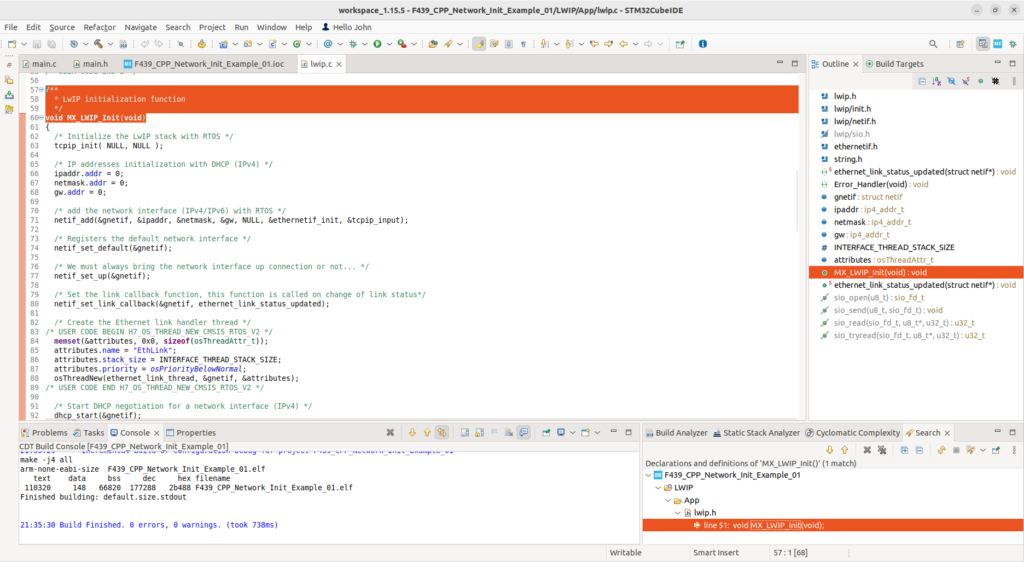
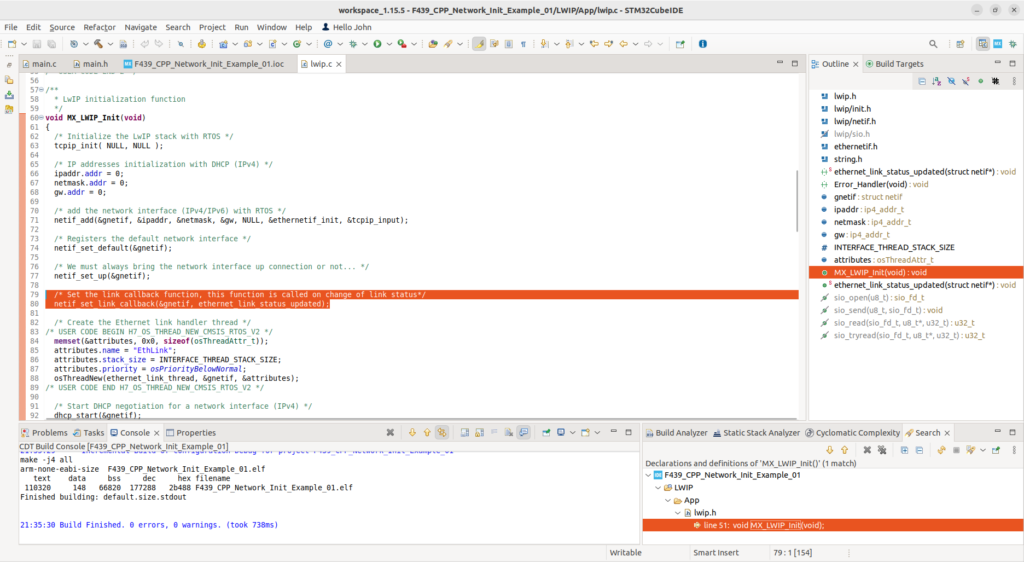
USART Dumb Terminal Output
